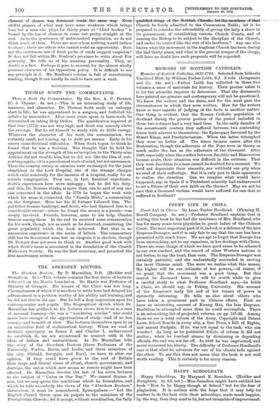THE ABERDEEN DOCTORS.
The Aberdeen Doctors. By D. Macmillan, D.D. (Hodder and Stoughton. 6s.)—This volume contains the first series of lectures delivered on the Ha,stie foundation. Dr. Hastie was Professor of Divinity at Glasgow: His tenure of the Chair was not long. Circumstances of which it is needless to write here had delayed his advancement to a position worthy of his ability and learning, and he did not live to old age. But he left a deep impression upon his contemporaries and pupils. The biographical sketch which Dr. Macmillan has prefixed to his lectures shows him to us as a man of unusual learning—he was a "wandering scholar" who could never have enough of the opportunities of study—and of no less courage and breadth of view. The lectures themselves open to us an unfamiliar field of ecclesiastical history. When we read of Scottish episcopacy as James I. and Charles I. endeavoured to establish, we„,.are , accustomed to connect with it the ideas of- failure , and. unworthiness. As Dr. Macmillan tells the story of the Aberdeen Doctors (three Professors of the University, Forbes, Baron, and Leslie, and three ministers of the city, Sibbald, Scroggie, and Ross), we have to alter our opinion. If they could have given to the rest of Britain their large and liberal views of ritual, church government, and doctrine, the union which now seems so remote might have been effected. Dr. Macmillan devotes the last of his seven lectures to the subject of "Union in Our Day." We cannot discuss it now, but we may quote the conditions which he formulates, and which he tells us embody the views of the "Aberdeen Doctors," themselves, it must be remembered, Episcopalians --" Let the English Church throw open its pulpits to the ministers of the Presbyterian Church ; let it accept, without reordination, the fully qualifietiolergy of the Scot-Mall- Churrirrlatatha meuthsaarofAilast. Church be freely admitted to the Communion Table ; let it be prepared to consider the advisability of giving the laity a share in its government, of establishing various Church Courts, and of causing the Bishop to be subject to the discipline of the Church, and under its control like the rest of his brethren." Any one who knows what the movement in the Anglican Church has been during the last thirty years, and what is the present temper of the clergy, will have no doubt how such proposals will be regarded.






















































 Previous page
Previous page